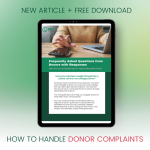Learn 3 ways donor gifts can be a great way to say thanks.
There’s nothing more powerful than saying, “thank you.”
Just two little words. But for your donor or volunteer, they’re the two most important words you ever say to them!
Many nonprofits have a solid thank you letter program that involves sending thank you letters and receipts within 24-48 hours of a gift being made. It’s one of several donor retention strategies every nonprofit should have. (If you aren’t thanking your donors immediately, we need to talk!)
But the question I often get is this: Should nonprofits spend money to thank supporters with a gift?
When I say “spend money,” I want to focus on promising a gift in exchange for a returned donation… a t-shirt, a coffee mug or any other tangible item that would have value to a donor. But let’s not completely exclude advance gifts in direct mail packages such as address labels or a partnership card.
Here’s what I’ve heard for years from clients and others in the nonprofit world: “Our donors don’t want us to spend money on any kind of tangible gift. They want us to spend our money on the people we’re helping.”
If you’ve been at a nonprofit for any time at all, you’ve probably heard that. You may have said it yourself!
So I’m going to go on record here: YES, it’s OK to spend money to thank supporters with a gift. BUT, it all depends on the type of supporter.
A major donor who gives $1 million might expect a very public thanks recognizing their gift, while a direct mail donor who gives $25 probably won’t. So different types of thank you gifts and/or recognition are appropriate for different types of supporters.
I want to talk about 3 different fundraising approaches to spending money to thank supporters with a gift.
- Gifts of thanks that advance your cause.
- Gifts of thanks that overlap with your cause.
- Gifts of thanks without a donation to your cause.
First, a quick reminder about why gifts of thanks can be so tricky. According to research published in the Journal of Economic Psychology, gifts can actually have a negative effect on charitable giving. When a number of people were offered a free gift like a tote bag or coffee mug in exchange for making a donation, researchers were surprised to find that it decreased donations.
The researchers termed this effect “crowding out.” Receiving a gift in return for their donation made the act of giving too transactional. It made donors feel selfish instead of selfless. Many nonprofit donors give altruistically, purely to do good for others.
So let’s say your donor is offered a coffee mug in return for their gift. According to the research, your donor now feels conflicted. The donation is about them getting something too, not just about helping. The research shows that conflict leads to fewer people donating.
As we said before, it’s sometimes important to spend money to thank some types of supporters with a gift. But how do you walk the line between giving a gift and maintaining those good feelings that come from purely selfless giving?
- Gifts of thanks that advance your cause. Roger Dooley of Forbes notes that when a gift of thanks or recognition included the charity’s logo, and it was the kind of gift that would be seen by other people, the “crowding out” effect was negated. Accepting the gift seemed like a means of helping the charity and spreading awareness of the cause.
- Gifts of thanks that overlap with your cause. Say that you’re a nonprofit that speaks to your supporters about the power of prayer in your regular communications with them. Including a prayer devotional or prayer guide would be a powerful gift of thanks that dovetails with a topic you already engage supporters on.
- Gifts of thanks without a donation to your cause. As Dooley so rightly notes in his article, “the ‘crowding out’ effect occurs when the donor is thinking about the thank you gift at the same time as the donation… so a gift sent after or before the donation won’t affect that donation.” Getting a gift of thanks or recognition at a different time is a surprise that might actually have a positive effect when your supporter receives their next appeal!
One interesting sidenote: We all know that advance gifts in direct mail like address labels and partnership cards are gimmicks that lift response rates. Advance gifts are popular for a reason – they work! Just check out this test from Neuromarketing:
Direct mail package with no gift
vs.
Direct mail package with small card+envelope gift
WINNER? The gift package received 17% more donations!
If you walk away with any takeaways here, make it this: Saying “thank you” to your supporters is an opportunity to show them how they’re fulfilling your mission… that is, helping to solve a pressing problem or issue.
Whether it be through heartfelt thank you letters and, in some cases, a gift, take every opportunity to share how their support has touched lives for good. Because the best gift you can give is making your supporters feel like they’ve made a tremendous difference.
SOURCES:
[1] https://www.sciencedirect.com/science/article/abs/pii/S0167487012000530
[2] https://www.forbes.com/sites/rogerdooley/2012/08/08/donor-gifts/?sh=7642776e10c6
[3] https://www.neurosciencemarketing.com/blog/articles/give-big-get-bigger.htm
Check out our recent Quick Shot: New Year, New Donors




